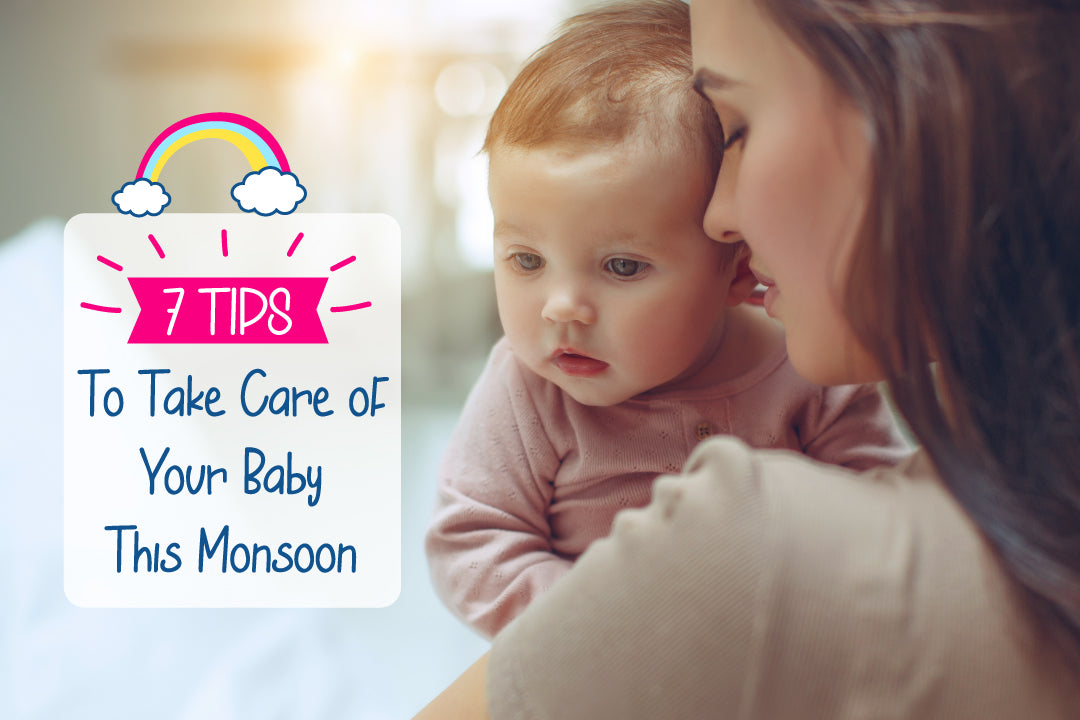7 Tips To Take Care of Your Baby This Monsoon Season

7 Tips To Take Care of Your Baby This Monsoon Season
Taking care of a newborn can be both tricky as well as a little difficult sometimes. Many factors need to be considered, such as lifestyle, travel plans, weather conditions, surroundings, etc. But the most important thing that one has to take into consideration is the change of season.
Though every season asks for attention and care, the rainy season requires a bit more. During monsoon, your baby's immunity becomes very weak, and they can come in contact with a lot of bacteria & viruses; thus, taking extra care during this time of the year becomes even more imperative. Here are some of the basic rules to follow this rainy season to ensure that you & your little one can have a good time.
Taking Care Of Hygiene: Keeping your baby hygienic is the first & foremost requirement. As monsoons are pretty humid, they can make the babies fussy and cranky sometimes. You must keep your little one clean and dry by sponging or bathing her regularly. Check the folds of her skin and joints cautiously for any wetness or itching. If the baby sweats a lot, you can use baby wipes to keep her dry and fresh. You should always wash or sanitize your hands before holding your baby, especially after coming from outside. While changing their diaper or tending to them in a public area, make sure you sanitize the surface with effective surface cleansing wipes.
Suitable Clothing: Rainy season can make your baby feel stuffy and sweaty. As the climatic conditions change drastically, you should change the clothing of your baby accordingly. Make sure that the child is wearing soft & weightless clothes. Comfy cotton clothes are the best during monsoon; wrap your little one properly to ensure complete protection from the ever-changing vagaries of temperature.
Keeping Away The Mosquitoes: During the monsoon, mosquitoes breed in large numbers thus, increasing the danger of diseases like malaria, dengue, etc. Hence, keep your little munchkin covered as mosquito bites can be quite painful & leave a red swelling. Make sure her crib is adequately covered with a mosquito net at all times. One can also opt for a baby-friendly mosquito repellent or use the mosquito patches readily available. Doors and windows should be closed or covered with a mesh at all times to prevent mosquitoes & flies from entering in.
Diaper Breaks: Appropriate diaper breaks are advisable to ensure that your baby’s skin can breathe freely. Wearing diapers for a longer duration can lead to skin rashes & infections. Try keeping your baby diaper-free at home, & clean the intimate areas with baby wipes at frequent intervals or during a nappy change. Opt for disposable baby mats for your baby to protect her crib, stroller or diaper-changing station. Reusable baby mats can be both cumbersome and infectious to use especially during this time of the year.
Food and Water: The rainy season acts as a catalyst to multiply the growth of bacteria that leads to the contamination of both food and water. You should boil your baby’s drinking water thoroughly as dirty water increases the chances of catching typhoid or diarrhea. If you're not giving breastmilk to your baby, make sure that the top feed is stored at the right temperature and covered at all times.
Keeping The House Clean: With so much humidity, stagnant water, mosquitoes, and flies all around, it becomes very tough to keep your home and surroundings clean. To avoid germs & bacteria from growing, you should wipe the floor regularly with baby-friendly disinfectants. House plants should not be left with stagnated water in them as that becomes a breeding ground for the mosquitoes. Make sure the house's drainage system is fully functional and aptly covered to reduce the chances of any infection.
Preventing Monsoon Illness: Monsoon season is the host of infections & increases the risk of catching water-borne diseases. Overflowing drains or stagnant water increase the risk of diseases like malaria, dengue, chikungunya, cholera, typhoid, etc. Hence, keeping your surroundings clean can help keep your baby safe. If you feel your baby can catch the flu or fever, do consult your doctor. Never give medicines that the physician does not prescribe. Nebulizers can be a great option if your baby is battling with cold during this time of the year.
To know more about our Baby Care Range, Click Here

